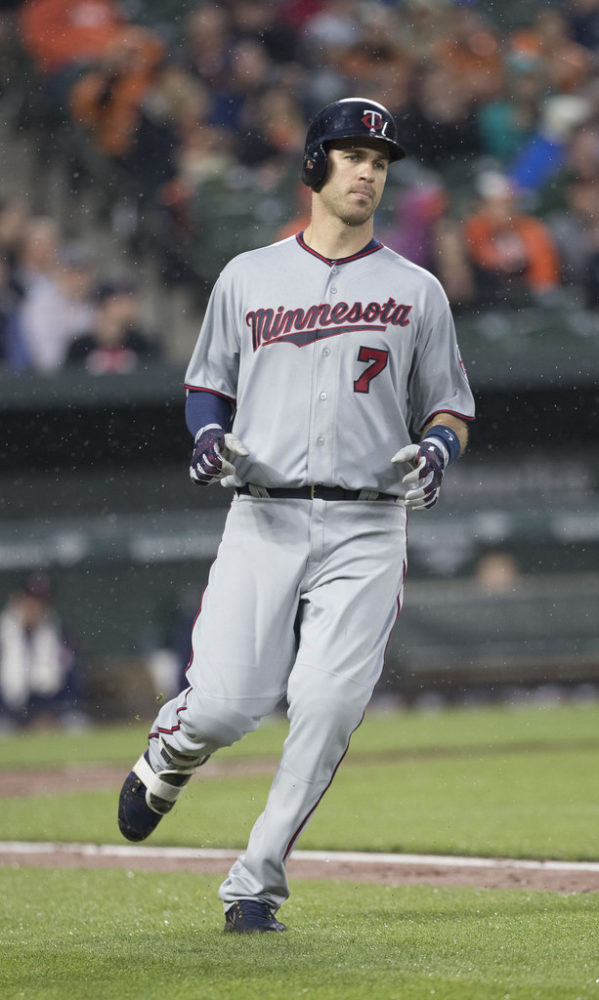Sentimentality has had mixed results for Minnesota

In Minnesota, it doesn’t get more homegrown than Joe Mauer.
There are two truths to sports in Minnesota. One is the painful fact that the state has the longest title drought of any sports market in the United States. The other is Minnesota’s teams love for their homegrown athletes.
As an outsider, the folksy charm of filling rosters with Minnesotans is part of what makes the state’s professional franchises so easy to root for.
It’s exactly why Vikings fans adore Adam Thielen. Born in Detroit Lakes, Minnesota and a graduate of Minnesota State-Mankato, Thielen is a Minnesota icon. The reason is simple: when fans look at Thielen, they’re looking at one of their own.
Beyond sports, it’s the same reason Minnesotans adore Prince. Prince always maintained a residence in the state, and even when he became famous he stayed loyal to the “Land of 10,000 Lakes.”
In some cases, however, Minnesota’s franchises love to a fault, which results in fans turning sour toward the players they once extolled.
In recent history, there’s no greater example of this than Minnesota Twins’ star Joe Mauer. The Twins made Mauer the No. 1 overall draft pick in the 2001 MLB First-Year Player Draft. Of course, Mauer — a standout at St. Paul’s Cretin-Derham Hall High School — possessed the requisite skills to excel in the majors. Still, there’s no denying that with names such as Mark Prior and Mark Teixeira in the mix, part of Mauer’s appeal was his hometown.
Mauer ultimately became the centerpiece of the franchise. He won three batting titles, an MVP award and was a perennial All-Star. Still, even as Mauer waved goodbye to the home fans in September of this past season, it wasn’t without ill-will.
At the height of his skill, Mauer signed an 8-year, $184 million contract with the Twins. Staying in Minneapolis made sense for Mauer, the fans and the franchise.
The Minnesota Wild used the same logic two years later when signing Minneapolis-born Zach Parise. The forward signed to a 13-year, $98 million deal just three days after hitting the open market. Returning to the “State of Hockey,” as the franchise calls it, is what Parise had wanted. It also gave the Wild a big-time, homegrown star to market.
Ultimately, both Mauer and Parise are lightning rods among Minnesota fans. The common criticism for both is that neither truly lived up to their contract. To some degree, this critique stems from frustration regarding Minnesota’s painful sporting truth: it’s been 27 years since the last championship.
In 15 seasons, Mauer never brought the Twins to the promised land. In over six seasons, Parise has yet to do so. Still, Mauer is a possible Hall of Famer and Parise leads the Wild in goals scored this year. But because of the weight of both expectations and their hometowns, the two will always be labeled as coming up short for Minnesota.
Perhaps though, more of the blame lies with the franchises. It’s fair to argue that both Mauer’s and Parise’s status as hometown heroes led their respective teams to overpay.
Both the Minnesota Timberwolves and Minnesota United have used the same reasoning to rationalize personnel decisions as well.
The Timberwolves traded for Tyus Jones on draft night in 2015, a move designed to bring the Apple Valley native back to Minnesota. Even head coach Flip Saunders said at the time that Jones had been on the franchise’s radar since he was 14.
The Loons’ roster boasts three Minnesota natives in Ethan Finlay, Brent Kallman and Eric Miller. Rare is the occasion where the words “Duluth-born” and “Ethan Finlay” don’t appear in the same sentence. The same can be said for Kallman and Miller, who are both from Woodbury.
Kallman is a mainstay from the Loons’ NASL days. Both Finlay and Miller were acquired via trades from the Colorado Rapids and Columbus Crew, respectively. In all three instances, it’s fair to wonder if the primary reason they play for the Loons is because they put the “MN” in MNUFC.
Even the University of Minnesota decided it was time to fall in love with a hometown star again. The Gophers hired Lindsay Whalen to become the head coach of the women’s basketball team. Whalen had a prestigious career with both the Gophers and the Lynx, but had no prior coaching experience. Still, she grew up in Hutchinson, Minnesota and is a legend for her exploits in Minneapolis.
This was enough for the athletic department to spurn other candidates in favor of Whalen. In year one, Whalen has had mixed results. Her Gophers are 17-7 overall, but 6-7 in Big 10 play.
Making the sentimental choice has been a calculated risk for all of Minnesota’s sporting institutions. At almost every turn, it’s been one they’ve been willing to make. Eventually, one of Minnesota’s teams will break the state’s title drought, but the second truth of Minnesota sports will still prevail. There’s no reason to think Minnesota will ever stop loving their homegrown icons.
